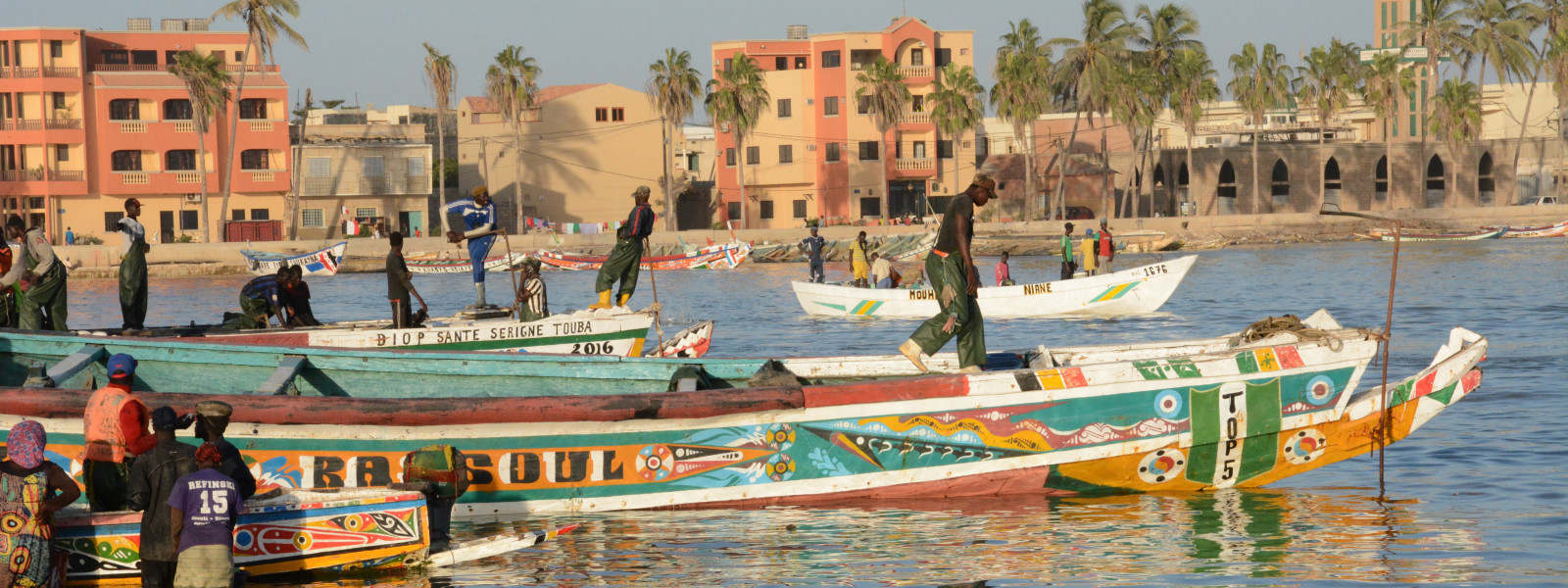The College’s Winter Dakar program is built upon a three-course African Civilizations sequence, taught in English. Program participants also take a French or Wolof language course, which runs at a normal pace through the quarter and is designed to help students live in and move around the city.
- Accommodation
- Meals with host family (roughly two meals per day)
- Instruction
- Student support
- Program excursions
- Emergency travel insurance (ISOS)
- Round-trip airfare to and from the program site
- Passport/visa fees
- Transportation on site
- Meals eaten outside of host family
- Course materials
- Personal entertainment and travel
- Communications (including cell phone usage)
- Health insurance and upfront payments for care
- Other miscellaneous expenses
Dakar is an impressive metropolis, a booming and modern multicultural city. Senegal’s intellectual life shines; the country has produced global thinkers and politicians, as well as scholars of literature, the humanities, and the social sciences. The country is also home to an array of museums, monuments, and marketplaces, as well as a wealth of culinary, musical, athletic and artisanal traditions. Possible extra-curricular activities for students include attending a live music venue, visiting galleries and street fairs that feature original art, watching a wrestling match, learning to cook ceb bu jën, Senegal’s national dish, or taking part in a pick-up game of soccer.
The Dakar program is operated in partnership with the West African Research Center, a non-profit educational organization located in the Fann neighborhood of Dakar. Students will have access to the resources and activities at WARC, including the library and café.
Faculty who teach on this program rotate from year to year. The faculty roster is designated by the program faculty director.
Students in the African Civilizations program are housed with host families in Dakar in the neighborhoods surrounding the West African Research Center. This offers a unique opportunity to form personal relationships with Dakarois, to participate in Senegalese family life, and to experience firsthand the “land of teranga” (Wolof for “hospitality”). Most meals will be prepared and eaten with your host family. The general diet is a light breakfast of coffee and/or milk with bread; a filling lunch (the main meal) usually made up of one of a variety of dishes of rice, root and fresh vegetables, and fish, lamb, beef or chicken cooked in vegetable, peanut or palm oil; and a light dinner of grilled or stewed protein, legumes, or fresh/cooked vegetables.
Living with a host family may require some adaptation on the student’s part. Accommodations in Senegal often vary significantly from those to which students in the US are accustomed. For example, homes may not have Internet (though the program center will), satellite television, or air-conditioning. Running hot water may not be available or plentiful. Prospective program participants are advised to be flexible and resourceful, attributes which will prove invaluable during their time abroad.
Participants in the Dakar: African Civilizations program remain registered as full-time students in the College. They take and receive credit for four courses: the three courses in the civilization sequence and the French or Wolof language class. The civilization sequence meets the College’s civilization requirement. Students who have already met this requirement may use these courses as electives. Their use, partial or total, in a program of study (major) must be approved by the undergraduate chair of the respective department. The language course will normally count as an elective. Course titles, units of credit, and grades are placed on the College transcript.
Study abroad students pay regular College tuition, a program fee, and a nonrefundable study abroad administrative fee. The tuition and program fee are paid in conformity with the home campus payment schedule, and a deposit toward the nonrefundable study abroad administrative fee is submitted when accepting a place in a program. Precise figures for the Dakar program during the 2025-2026 year are listed below:
Winter tuition: as set by the Bursar’s Office
Study abroad administrative fee: $675
Dakar program fee: $5,960
Program fee includes:
Out-of-pocket expenses include:
You can plan on spending in the range of $50 to $100 per week on meals and incidentals while on the program, though frugal students may spend less, and others could spend much more. Bear in mind that while the cost of living in Dakar is relatively low, it is also possible to run short of money if you are unwary. It is therefore essential that you budget your funds prudently, apportioning your resources so that they last for the duration of the program. If you are planning to travel before or after the program or on weekends, you should budget accordingly.
Study abroad students retain their financial aid eligibility. For more information about financial aid resources, please see our Tuition, Fees, and Funding section.
The Dakar program is open to University of Chicago undergraduate students only. Applications from outside the University are not accepted.
The program is designed for undergraduates in good academic and disciplinary standing who are beyond their first year in the College. While the program stipulates no minimum grade-point average, an applicant’s transcript should demonstrate that seriousness of intellectual purpose and engagement likely to yield the most from this opportunity. Because the civilization sequence is taught in English, there is no language prerequisite, although students are encouraged to take French or Wolof on campus before the program begins.
Because of the considerable demand for the Chicago civilization programs abroad, no student may participate in more than one of these programs. Each application is examined on the basis of the student’s scholastic record and personal statement. If you are interested in applying for this program please fill out the online application.
To discuss the Dakar: African Civilizations program and the possibility of participating, please contact Michaela Foreman.
